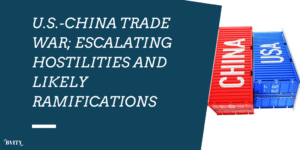
The looming possibility of a trade war between U.S. and China seems to be ever on the rise. The arrival of Treasury Secretary Steve Mnuchin in Beijing sometime this week to discuss the large sanctions might not prove fruitful, as although China is open to discussing and diffusing the issue to prevent a full on trade war, they refuse to discuss the two big requests of the Trump administration for a mandatory $100 billion cut in America’s $375 billion annual trade deficit with China and a curb on Beijing’s $300 billion plan to fund the country’s industrial upgrade into advanced technologies like artificial intelligence, commercial aircrafts, semiconductors, and electric cars.
After the back and forth of tariffs between U.S. and China from January to April 17, an accumulation of tariffs have been documented and have been deemed as damage incurring to both countries by a percentage of people. Alibaba co-founder Joseph Tsai echoed this sentiment and said, on CNBC’s “Closing Bell”, that U.S. businesses are already suffering from the tariff tit-for-tat between the countries and believes the U.S. would suffer the most in an eventuality of the trade war, especially the soybean sector.
Although, China too would suffer some damage if the U.S. soybean sector is hit. In that possible scenario, China may have to turn to Brazil whose soybeans are more expensive and it could result in inflation. There’s also the ban by the U.S. commerce department on selling semiconductors to ZTE, a Chinese telecommunication powerhouse, for seven years. The Trump administration is using ZTE’s failure to comply with the terms of a settlement agreement of $1.2 billion to Uncle Sam, back in March 2017, relating to North Korean and Iran sanctions as the reason for the ban. It would be a major blow to China as the semiconductor market is dominated by Americans.
